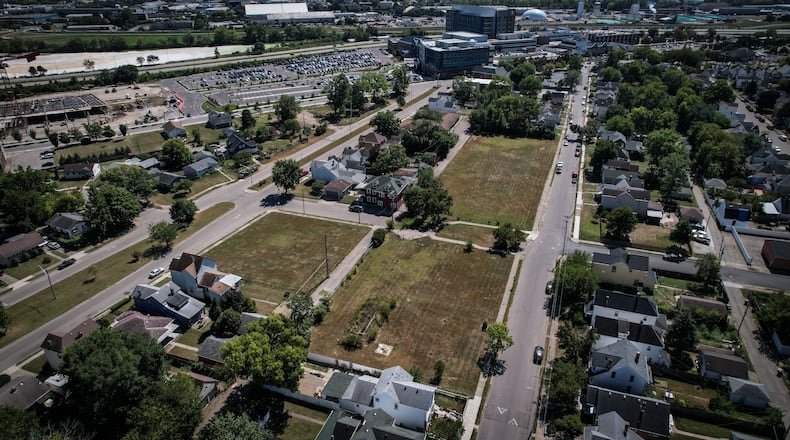Many children have been placed in out-of-home care because their parents are addicted to opioids, are incarcerated or have died from drug overdoses.
“As a children’s hospital, we know children in kinship situations experience a lot of trauma and instability often impacting their health and educational outcomes,” said Jessica Salem, executive director for the Center for Health Equity at Dayton Children’s. “We believe this kind of housing will help to build stability, safety and support for these families.”
The city of Dayton also wants to see new housing constructed at a nearby site in Old North Dayton.
However, city planning officials said only one developer responded to a request for proposals, and the company wanted more funding than the city has available to offer.
Kinship housing
Dayton Children’s a couple of years ago bought about 2.3 acres of land near the hospital for a kinship care housing project.
The hospital, located along Valley Street in Old North Dayton, proposes building 26 dwellings on Alaska and Rita streets, according to a use variance application submitted to the city. The plans call for 13 residential structures, with each housing two families.
The vacant land was formerly a school site, and the cottage-style village will have apartments targeted at families with children who are not being raised by their parents.
The hospital said that Dayton and the state of Ohio have seen a sharp increase in the number of kinship caregivers due to the opioid epidemic, which has resulted in many overdose deaths and families being torn apart by addiction.
Children living in kinship situations often have significant trauma from experiencing the incarceration or death of their parents, and kinship families often face housing instability and are forced to move around.
Many kinship caregivers — often grandparents — live on fixed incomes and have limited housing options, the hospital said.
Some caregivers reside in age-restricted housing, where children are not allowed.
“We know affordable housing is at a premium in Dayton and we believe this project not only will help alleviate some of the challenges around housing but also give kinship families safe and appropriate housing they need,” said Salem. “This project is very unique to Dayton; we are not aware of one exactly like it anywhere else in the country.”
The new housing project would create apartments affordable to families of four, possibly with annual incomes of about $40,000 to $60,000. The housing will be income-restricted because of some of the funding sources, which include a $2 million award from the U.S. Department of Housing and Urban Development and $500,000 from the city of Dayton’s federal COVID relief funds.
The plans also call for amenities including a community building and play spaces. But the project requires use variances from the city, in part because multi-family dwellings are not permitted in that zoning district.
The Point housing
Earlier this year, the city of Dayton issued a notice of funding opportunity for new housing on land at the northeast corner of Valley Street and North Keowee Street in Old North Dayton.
The one-acre property is slightly more than half a mile from the kinship housing site.
Dayton asked for proposals for this project, which is called “The Point.” The city said it was interested in attached single-family homes, condos or multifamily apartments.
The city received only one proposal in response, which came from Pennrose LLC, a Pennsylvania-based real estate development company that has created more than 27,000 rental housing units.
Pennrose proposed a $12.3 million project that would create about 48 new “workforce” housing units in Old North Dayton. The developer said the unit count possibly could increase to 60 or more.
The real estate development firm said it had an innovative and achievable vision for the site that would create a mix of units. Pennrose said it planned to request about $5 million in “gap funding.”
Tony Kroeger, Dayton’s planning and land use division manager, said city staff liked what Pennrose proposed, but the company requested more funding than what the city can provide.
Credit: JIM NOELKER
Credit: JIM NOELKER
The city plans to put some of its $138 million in federal COVID relief funds toward new housing.
The Point is still an ideal site for new housing, but the property has challenges, including a large storm utility that runs through the middle, Kroeger said.
Kroeger said the city appreciated Pennrose’s interest in the site, and the firm clearly has done good work in other communities.
“We look forward to working with Pennrose — somewhere in the city of Dayton — in the future,” he said.
About the Author







